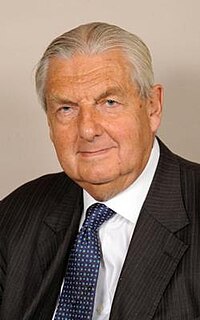Related Research Articles

Hansard is the traditional name of the transcripts of Parliamentary debates in Britain and many Commonwealth countries. It is named after Thomas Curson Hansard (1776–1833), a London printer and publisher, who was the first official printer to the Parliament at Westminster.

Patrick Barnabas Burke Mayhew, Baron Mayhew of Twysden, was a British barrister and politician.

Earl of Ranfurly, of Dungannon in the County of Tyrone, a title in the Peerage of Ireland, was created in 1831 for Thomas Knox, 2nd Viscount Northland. He had earlier represented County Tyrone in the House of Commons, and had already been created Baron Ranfurly, of Ramphorlie in the County of Renfrew, in the Peerage of the United Kingdom in 1826. Knox was the eldest son of Thomas Knox, who represented Dungannon in the Irish House of Commons. He was created Baron Welles, of Dungannon in the County of Tyrone, in 1781, and Viscount Northland, of Dungannon in the County of Tyrone, in 1791. Both titles were in the Peerage of Ireland. Lord Northland also sat in the British House of Lords as one of the 28 original Irish Representative Peers.
Sligo Borough is a former borough constituency in Ireland, represented in the House of Commons of the Parliament of the United Kingdom.
Dungannon was a United Kingdom Parliament constituency, in Ireland, returning one MP. It was an original constituency represented in Parliament when the Union of Great Britain and Ireland took effect on 1 January 1801.

Maldon is a constituency represented in the House of Commons of the UK Parliament since 2010 by John Whittingdale, a Conservative.
Yarmouth was a borough constituency of the House of Commons of England then of the House of Commons of Great Britain from 1707 to 1800 and of the House of Commons of the United Kingdom from 1801 to 1832. It was represented by two members of parliament (MPs), elected by the bloc vote system.
Sir Robert Anstruther, 5th Baronet was a Scottish Liberal Party politician who sat in the House of Commons between 1864 and 1886.
Bridgnorth was a parliamentary borough in Shropshire which was represented in the House of Commons of England from 1295 until 1707, then in the House of Commons of Great Britain until 1800, and in the House of Commons of the Parliament of the United Kingdom from 1801 until its abolition in 1885.
Devon was a parliamentary constituency covering the county of Devon in England. It was represented by two Knights of the Shire, in the House of Commons of England until 1707, then of the House of Commons of Great Britain from 1707 to 1800 and finally the House of Commons of the United Kingdom from 1801 to 1832. Elections were held using the bloc vote system of elections.
Rutland was a parliamentary constituency covering the county of Rutland. It was represented in the House of Commons of the Parliament of the United Kingdom until 1918, when it became part of the Rutland and Stamford constituency, along with Stamford in Lincolnshire. Since 1983, Rutland has formed part of the Rutland and Melton constituency along with Melton Mowbray from Leicestershire.
Boroughbridge was a parliamentary borough in Yorkshire from 1553 until 1832, when it was abolished under the Great Reform Act. Throughout its existence it was represented by two Members of Parliament in the House of Commons.
Aldeburgh in Suffolk, was a parliamentary borough represented in the House of Commons of the Parliament of the United Kingdom and its predecessor bodies.
Sir William Edward Knox OSJ, KSJI was born in Kew, Victoria, Australia and was the Member of the Legislative Assembly of Queensland representing the district of Nundah for the Liberal Party between from 1957 to 1989.
Somerset was a parliamentary constituency in Somerset, which returned two Members of Parliament (MPs), known traditionally as knights of the shire, to the House of Commons of England until 1707, the House of Commons of Great Britain from 1707 to 1800, and the House of Commons of the United Kingdom from 1801 to 1832.
Thomas Knox, 1st Earl of Ranfurly, styled The Honourable Thomas Knox between 1781 and 1818 and known as The Viscount Northland between 1818 and 1831, was an Irish peer and politician.
William Windsor Parker was a British Conservative Party politician. He was known as Windsor Parker.
Francis Bruen was an Irish Conservative Party politician. He was Member of Parliament (MP) for Carlow Borough from 1835 to 1837, and briefly in 1839, taking his seat in the House of Commons of what was then the United Kingdom of Great Britain and Ireland.
Hamilton Knox Grogan Morgan, known as Hamilton Knox Grogan until 1828, was an Irish Whig, Repeal Association and Conservative politician.
The Bjelke-Petersen Ministry was a ministry of the Government of Queensland and was led by Premier Joh Bjelke-Petersen, who led the Country Party and its successor, the National Party. It succeeded the Chalk Ministry on 8 August 1968 as part of a series of events following the death of former Premier Jack Pizzey on 31 July. It was succeeded by the Ahern Ministry on 1 December 1987 following Bjelke-Petersen's resignation as Premier.
References
- ↑ "Mr John Knox (Hansard)". Historic Hansard. Retrieved 27 February 2019– via UK Parliament.